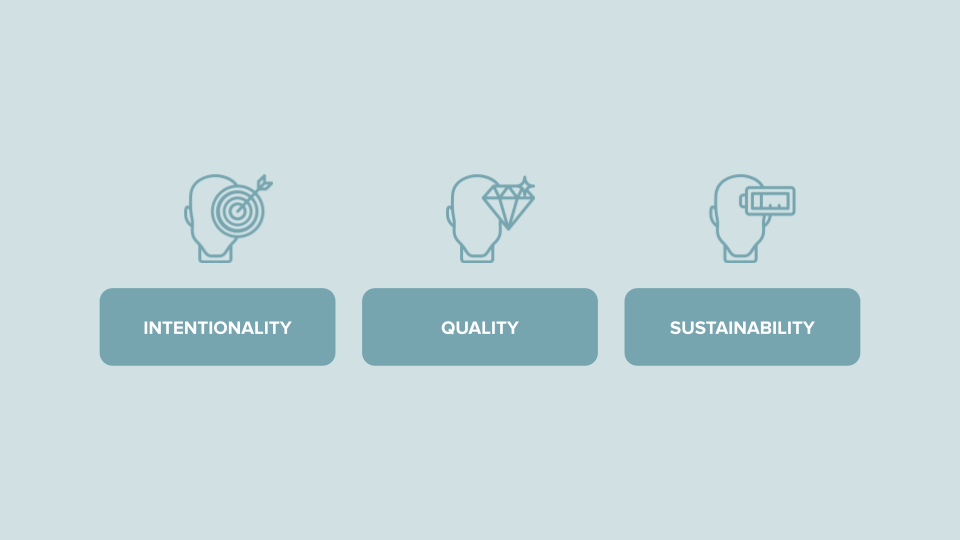Hustle culture uses speed as a measure of performance. How fast can you ship a new feature? How many prospective clients can you call in an hour? How much of your day can you devote to work? If you’re not fast, are you even being productive? This harmful mindset results in burnout, poor decision-making, and bad communication.
It may seem counterintuitive, but slowing down can be a faster way to achieve your goals. Fighting our urge to live and work faster can lead to clearer thinking, deeper connections, and better mental health.
Slowing down to go further
The illusory imperative to keep up with everyone else is hurting us. Faster is not always better — far from it. By slowing down, you can build three key pillars to rely on in your life and work.
- Intentionality. When we focus on speed, we may blindly follow a path that may not be the most efficient one to reach our goals — whether it’s a path dictated by others, or one that seems the most obvious. Slowing down allows us to be more intentional when making decisions and executing our plans.
- Quality. Being fast allows us to do more. But “doing more” does not equal “doing what’s best”. Doing things slower means we can increase the quality of the output, and even sometimes of the experience itself. Would you design a more polished feature if you had two days, or if you had two weeks? Would you enjoy a landscape better if you are driving over the speed limit, or if you are taking a leisurely walk? Would you learn more about a friend if you had a quick chat, or a long conversation? Of course, we may not always have the luxury of slowness, but we should make a conscious effort to question artificial time constraints.
- Sustainability. Consistent effort over time is more sustainable than pushing your limits to work as fast as possible. To do our best work, we need mental downtime, space for self-reflection, and a realistic schedule we can actually keep up with.
Overall, slowing down will help you make better decisions, connect deeper with people, have more meaningful experiences, all while improving your mental well-being by avoiding burnout. You may go slower, but you will go further.
Injecting slowness in all areas of your life
There are many areas of our lives where we could benefit from slowing down, some more obvious than others.
- Food. Numerous studies suggest that eating fast is linked to obesity. For instance, a survey of more than 50,000 in China showed that fast eating children were more likely to be obese, and to have a higher energy intake from fast food. On the other hand, eating slowly has been associated with lower hunger and lower calorie intake in healthy people. 腹八分目 (pronounced hara hachi bun me which translates to “eat until your belly is 80% full” ) is a common practice in Okinawa, which has the world’s highest proportion of centenarians. Since your brain takes around 20 minutes to register that you’re full, you can only do this if you eat slowly. Practice mindful eating by chewing chewing more, drinking sips of water, and paying attention to the taste and texture of your food.
- Communication. In his book The Stress Solution, clinical psychologist Arthur Ciaramicoli explains: “We learn to become more empathic when we slow down, become present, and are fully committed to understanding another person’s uniqueness.”
- Fashion. It may not immediately come to mind, but your closet is another place where you can inject more slowness. Professor Hazel Clark from the Parsons School of Design defines slow fashion as “the valuing of local resources and distributed economies; transparent production systems with less intermediation between producer and consumer; and sustainable and sensorial products that have a longer usable life and are more highly valued than typical consumables.” Slow fashion is more ethical and more sustainable. Shop less often, focus on timeless designs, and take your time to buy better quality garments that will last longer.
- Exercise. While high-intensity exercise is all the craze, research suggests moderate-intensity, low-impact activity (such as yoga and walking) is just as effective as high-impact activity (such as running) in lowering the risk of heart disease. If you already exercise regularly, make sure to slow down from time to time and to take days off so your body can rest. And don’t beat yourself up if you’re not into jumping jacks and sprinting, there are plenty of slower exercises that can benefit your health.
- Decision-making. Rushed thinking may lead to bad decisions. Slowing down allows us to be more deliberate when considering our options. As Eknath Easwaran puts it: “By slowing down, we can train the mind to focus completely in the present. Then we will find that we can function well whatever the difficulties. That is what it means to be stress-proof: not avoiding stress but being at our best under pressure, calm, cool, and creative in the midst of the storm.”
Whatever area of your life you are targeting, making space for self-reflection is crucial. Helpful methods to slow down include journaling, meditation, and taking breaks. Speed may sometimes be a goal in and of itself, but it should be an intentional goal rather than an automatic need to “keep up” with others.
An easy trick to slow down is to ask: “Why the rush?” and to take a step back. Is speed really adding to the quality of the output? Again, in some rare cases, it may be the case. For instance, if you work as a journalist for an outlet, it makes sense to work as fast as possible for breaking news announcements. However, you will find that many goals would be better achieved by being more intentional.

